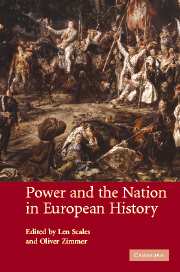Book contents
- Frontmatter
- Contents
- List of contributors
- Introduction
- PART I APPROACHES AND DEBATES
- PART II THE MIDDLE AGES
- PART III ROUTES TO MODERNITY
- PART IV MODERNITY
- 12 Enemies of the Nation? Nobles, foreigners and the constitution of national citizenship in the French Revolution
- 13 Nation, nations and power in Italy, c. 1700–1915
- 14 Political institutions and nationhood in Germany, 1750–1914
- 15 Nation, nationalism and power in Switzerland, c. 1760–1900
- 16 Nation and power in the liberal state: Britain c. 1800–c. 1914
- Index
13 - Nation, nations and power in Italy, c. 1700–1915
Published online by Cambridge University Press: 02 December 2009
- Frontmatter
- Contents
- List of contributors
- Introduction
- PART I APPROACHES AND DEBATES
- PART II THE MIDDLE AGES
- PART III ROUTES TO MODERNITY
- PART IV MODERNITY
- 12 Enemies of the Nation? Nobles, foreigners and the constitution of national citizenship in the French Revolution
- 13 Nation, nations and power in Italy, c. 1700–1915
- 14 Political institutions and nationhood in Germany, 1750–1914
- 15 Nation, nationalism and power in Switzerland, c. 1760–1900
- 16 Nation and power in the liberal state: Britain c. 1800–c. 1914
- Index
Summary
HISTORIANS AND THE ITALIAN NATION
The mainstream of the political historiography of European states, from the middle of the nineteenth century to the middle of the twentieth (and often beyond), reads the history of the nation's past through the filter of the final outcome of the nation-state. The ‘Prussian school’ has attracted particular attention, and indeed it exemplifies the untroubled coexistence of a historicism that exalted the state and the affirmation of a ‘scientific’ historical methodology in tune with the gospel of positivism. But whether their approach to history was ‘Romantic’ or scientific, national pride and the certainty of progress constituted central elements in the cultural habitus of European intellectuals, which underpinned the writing of the history of the individual states, old as well as new. Although they were more marked in newly unified states, the historians of old national states shared the same convictions, and – like François Guizot or John Seeley – facilely read into them national missions.
In a comparative European context, Italian historiography in this respect is in no way exceptional. From the earliest decades after unification until the fall of fascism, from Nicomede Bianchi and Alessandro Luzio to Pietro Silva and Gioacchino Volpe, historians interpreted the country's history as possessing an unbroken continuity across the centuries, expressed through the presence of an Italian nation, alongside and usually incorporated in the Savoy dynasty, culminating in pre-ordained fashion in a unified independent state (and, for Volpe, in fascism).
- Type
- Chapter
- Information
- Power and the Nation in European History , pp. 295 - 314Publisher: Cambridge University PressPrint publication year: 2005
- 1
- Cited by



